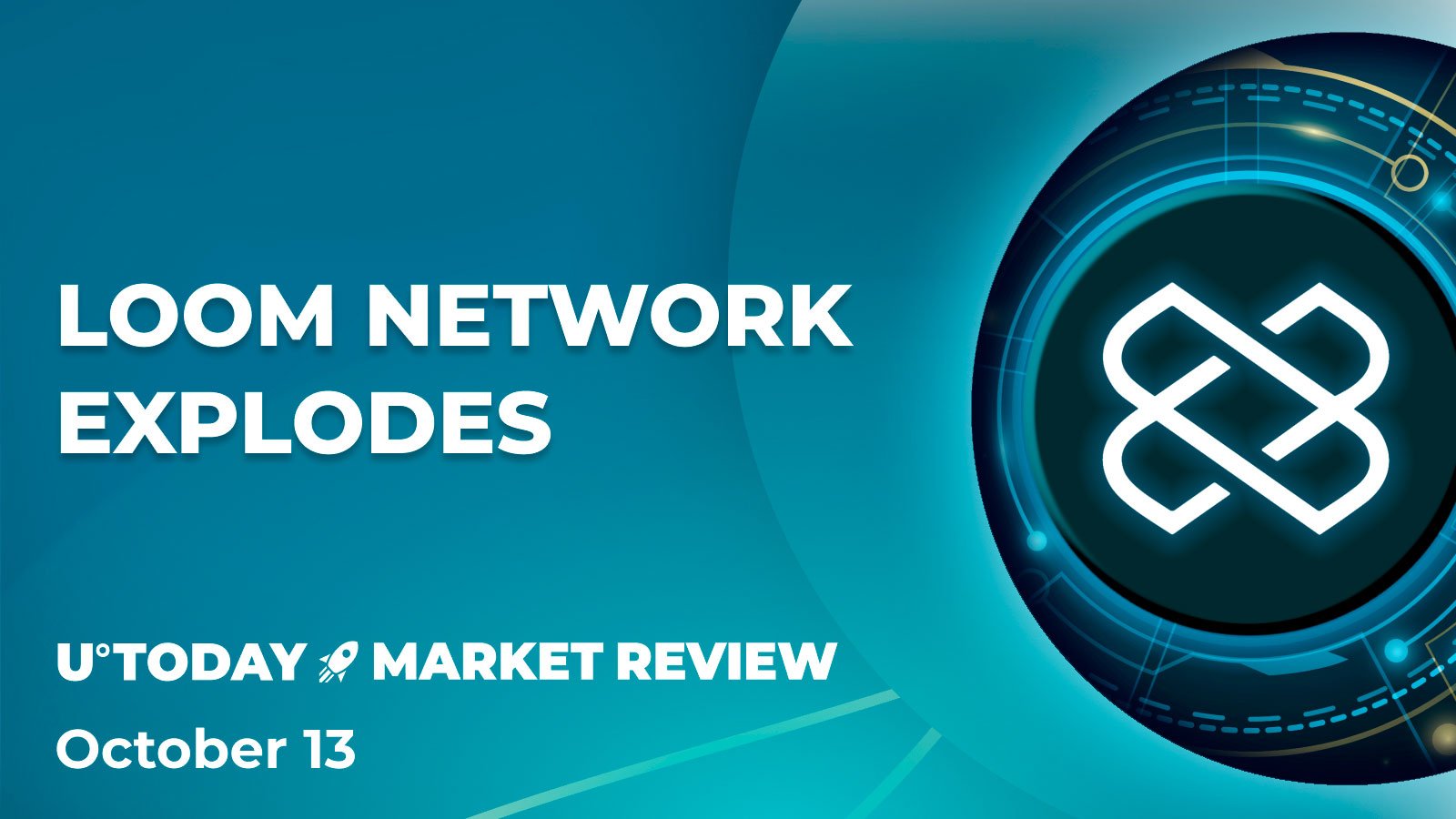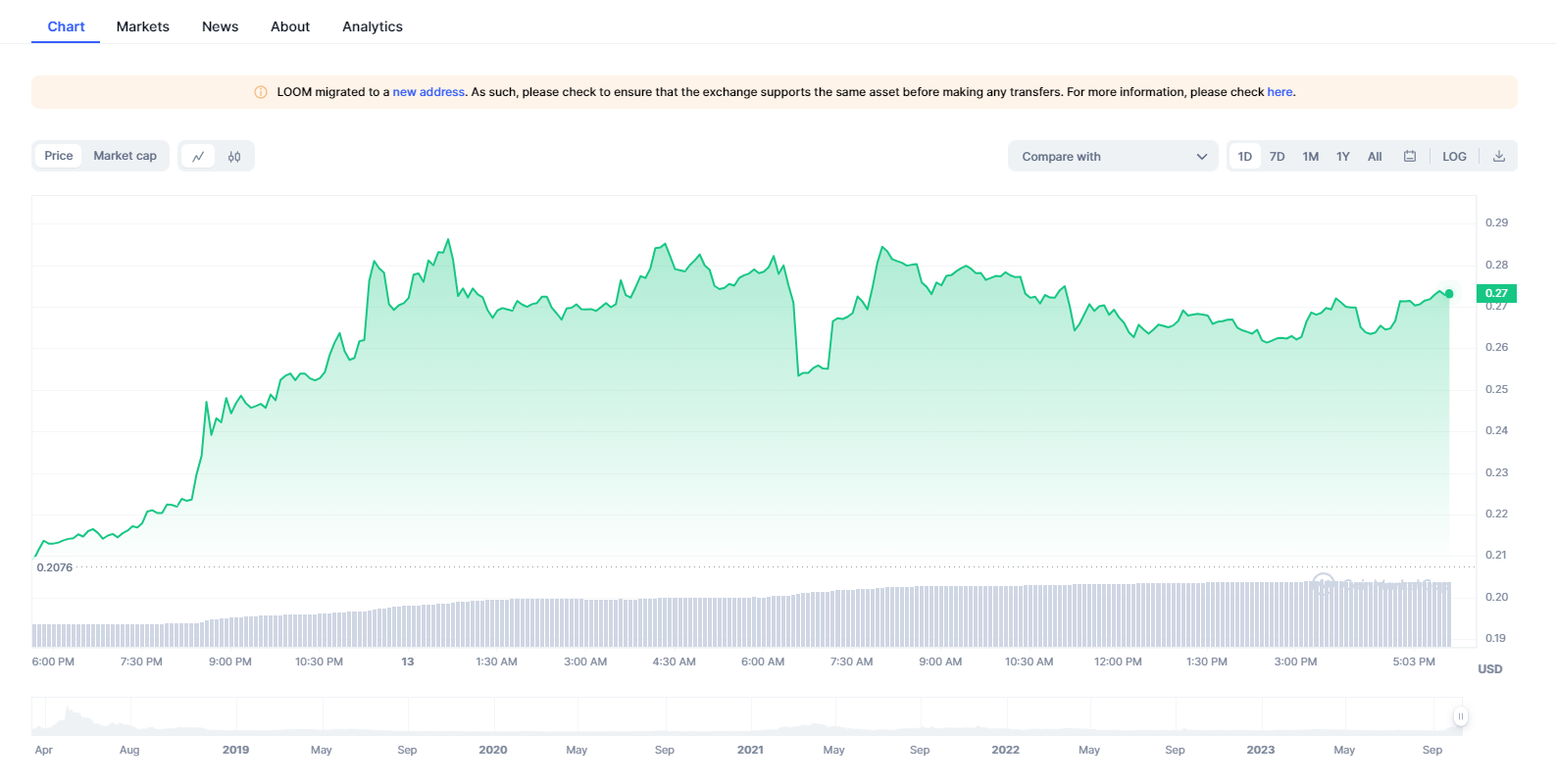
Disclaimer: The opinions expressed by our writers are their own and do not represent the views of U.Today. The financial and market information provided on U.Today is intended for informational purposes only. U.Today is not liable for any financial losses incurred while trading cryptocurrencies. Conduct your own research by contacting financial experts before making any investment decisions. We believe that all content is accurate as of the date of publication, but certain offers mentioned may no longer be available.
Loom network’s native token, LOOM, has been on a meteoric rise, showing explosive performance on the crypto market. One might wonder about the catalyst behind such bullish momentum, and it is linked to an exciting development.
Today, it was announced that Loom is joining forces with Atlassian, a global leader in team collaboration software. The companies have signed a definitive agreement wherein Atlassian will acquire Loom for a whopping $975 million. This news has sent ripples across the industry, marking a new chapter of growth and opportunity for both entities.

Reflecting on the market’s reaction, the LOOM token’s price surged, mirroring the community’s optimism about this partnership. The integration foresees a future where the mundanities of knowledge work are minimized, leveraging the best of JIRA, Confluence and Loom’s innovative video features.
The foundations of this acquisition trace back several years, thanks to the continuous efforts of key figures in both companies. Loom has always been on Atlassian’s radar, especially noted by Atlassian’s cofounders, Mike Cannon-Brookes and Scott Farquhar. Their belief in Loom’s potential was evident even when the platform was registering under one million looms per month back in 2019. Flash forward to the present, and Loom boasts over seven million looms recorded monthly.
This acquisition does not just represent a change of hands. It is a testament to Loom’s significant growth and robust financial health. The vision shared by Loom’s leaders is to make this acquisition one of the most successful in the software world. They aspire to a future in which users cannot imagine using Atlassian tools like Confluence and JIRA without the integrated features of Loom.
Solana’s growth in trouble
Solana (SOL) has undoubtedly caught the attention of many in the crypto world, especially with its impressive surge in September. However, upon scrutinizing its charts across different time frames, certain patterns emerge that suggest this growth might be under a potential threat of receding.
On the daily chart, Solana witnessed a remarkable bullish run in September, characterized by sharp upward candles. This phase saw extensive buying pressure, which led to the crypto breaking past previous resistance levels.
However, this same chart now reveals that SOL is experiencing a period of consolidation, with prices moving sideways, and candles are becoming smaller. There is an apparent struggle between buyers and sellers, leading to a state of equilibrium.
More significantly, the Moving Average (MA) lines showcase a potential bearish crossover in the near future. The short-term MA seems to be approaching the long-term MA from above, a classic indicator of a potential downtrend. If this crossover happens, it could signal a shift in momentum from the bulls to the bears.
Switching our attention to the weekly chart, the perspective becomes even more enlightening. SOL’s explosive growth is more evident, with a sharp vertical climb. However, after this climb, the chart showcases red candles, hinting at a bearish reversal. The volume bars below the price candles also provide an indication of decreased buying interest in recent weeks compared to the peak in September.
Cardano lands on important support
Over the past few months, Cardano (ADA) has been under the watchful eyes of many investors, traders and market analysts. The second image reveals the Total Value Locked (TVL) in Cardano, which can be considered a metric for gauging the strength and potential of a blockchain network. A high TVL signifies robust platform activity and user engagement, and as depicted, Cardano saw its peak TVL around April, after which it began its descent.
The daily price chart of ADA further corroborates the trend seen in its TVL. As we can see, ADA has been on a downward trajectory, with the price being suppressed beneath both the medium and long-term moving averages, signaling prevailing bearish sentiment. The long downward red candles indicate strong sell-offs, with minor upward green candles representing temporary relief or minor bullish pullbacks.
Notably, ADA seems to have reached a critical “Adamantium” support level – a level it is hesitant to breach. But the million-dollar question is: will ADA bounce back from here?
The fact that ADA is mostly following the general market tendency is worth highlighting. It is not just ADA that is facing the heat; a large chunk of the market is currently undergoing a similar phase. Cardano’s price movements have shown a strong correlation with other major assets, indicating that its price is heavily influenced by broader market trends.
Read More: u.today










 Bitcoin
Bitcoin  Ethereum
Ethereum  Tether
Tether  XRP
XRP  Solana
Solana  USDC
USDC  Dogecoin
Dogecoin  Cardano
Cardano  TRON
TRON  Lido Staked Ether
Lido Staked Ether  Wrapped Bitcoin
Wrapped Bitcoin  Sui
Sui  Wrapped stETH
Wrapped stETH  Chainlink
Chainlink  Avalanche
Avalanche  Hyperliquid
Hyperliquid  Stellar
Stellar  Shiba Inu
Shiba Inu  LEO Token
LEO Token  Hedera
Hedera  Bitcoin Cash
Bitcoin Cash  Toncoin
Toncoin  Litecoin
Litecoin  Polkadot
Polkadot  USDS
USDS  WETH
WETH  Monero
Monero  Binance Bridged USDT (BNB Smart Chain)
Binance Bridged USDT (BNB Smart Chain)  Wrapped eETH
Wrapped eETH  Bitget Token
Bitget Token  Pepe
Pepe  Pi Network
Pi Network  Ethena USDe
Ethena USDe  Coinbase Wrapped BTC
Coinbase Wrapped BTC  WhiteBIT Coin
WhiteBIT Coin  Bittensor
Bittensor  Dai
Dai  Uniswap
Uniswap  Aave
Aave  NEAR Protocol
NEAR Protocol  Aptos
Aptos  OKB
OKB  Jito Staked SOL
Jito Staked SOL  Ondo
Ondo  BlackRock USD Institutional Digital Liquidity Fund
BlackRock USD Institutional Digital Liquidity Fund  Tokenize Xchange
Tokenize Xchange  Cronos
Cronos  Ethereum Classic
Ethereum Classic